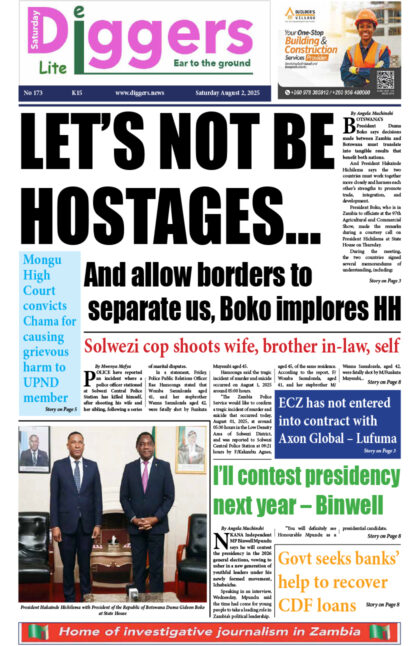BANK of Zambia governor Christopher Mvunga says President Hakainde Hichilema’s pronouncement that his government had taken over an empty Treasury was said in the context of the country having less money in its coffers compared to what was needed to service the debt.
And Mvunga says the monetary policy committee has maintained the monetary policy rate at 8.5 percent.
Meanwhile, Mvunga has refused to comment on the leaked telephone conversation between him and PF member Chishimba Kambwili which suggests the latter was trying to influence the issuance of government bonds, saying it’s a private conversation which should be left that way.
At a policy briefing, Wednesday, Mvunga said the country’s reserves had $2.9 billion against the potential outlay of about US$13 billion.
“The Head of State said that the Treasury was empty. I think you need to understand it in the context of how much money we have versus how much money we owe. So yes, we can talk about the reserves at 2.9 billion against the potential outlay of about US$13 billion. So within that context, you are in the negative realm because you need to raise a balance between 2.9 billion and 13 billion to pay your debt. Let me put it in a layman’s way, if I have got a K100 in my house and I owe ZESCO K3,000 for electricity bills, I can’t be boasting that I have got money in the house,” he said.
“I think it is within that context that the Head of State is making that pronouncement that I owe more than what I have. So I need to raise money, I need to work extra hard to bridge the gap. I think that is the context in which I understand it but obviously, I stand to be corrected. You can pose that question to the Presidential spokesperson who can further elaborate, but that is my understanding of what the Head of State said.”
And Mvunga said the Monetary Policy Committee had maintained the monetary policy rate at 8.5 percent.
“At its August 30 to 31, 2021 meeting, the Monetary Policy Committee decided to hold the Monetary Policy Rate at 8.5 percent. In arriving at this decision, the committee remained mindful of the subdued economic activity and existing vulnerabilities in the financial system. Implementation of fiscal adjustment measures premised on fiscal discipline, the dismantling of domestic arrears, enhancement of revenue collections, achieving a sustainable budget balance, securing an IMF program, and external debt restructuring remain critical to restoring macroeconomic stability,” he said.
“The decision noted that, over the forecast horizon, inflation is expected to decelerate faster and edge closer to the target range than was envisaged in the May 2021 MPC meeting. Underlying the decline in inflation is mostly the favorable outlook for the exchange rate and improved prospects for fiscal consolidation. In this regard, the MPC decided to maintain the Monetary Policy Rate at 8.50 percent. the Bank remains committed to adjusting the Policy Rate upward should the disinflationary be slower than expected.”
Meanwhile, when asked whether the leaked telephone conversation between him and Kambwili regarding authorisation of bond issuance wouldn’t dent the Central Bank’s image, Mvunga said he had no comment.
“I think when I was in Parliament, Mr Speaker once told me that you don’t debate yourselves. So I take note of your concern but unfortunately, that was a private conversation and let’s leave it that way. Unfortunately it came on social media,” he said.
Mvunga said over the next eight quarters, inflation was projected to decelerate faster than was earlier anticipated although it would remain above the 6-8 percent target range.
“Inflation maintained an upward trend in the second quarter, rising to 23.5 percent from 22.2 percent in the first quarter. The depreciation of the Kwacha as well as seasonal low supply of some vegetables and fish continued to be the key drivers of inflation. In addition, imported inflation contributed to inflationary pressures observed during the review period. The food and non-food inflation increased to 29.0 percent and 17.2 percent from 27.0 percent and 16.6 percent, respectively,” he said.
“In August 2021, inflation declined marginally to 24.4 percent from 24.6 percent in July mainly as a result of the appreciation of the Kwacha against the US dollar. Over the next eight quarters, inflation is projected to decelerate faster than was earlier anticipated although it will remain above the 6-8 percent target range. Inflation is now projected to average 22.6 percent, 15.5 percent and 11.9 percent in 2021, 2022 and the first half of 2023, respectively. Some of the previously dominant upside risks to inflation forecasts, that were highlighted in the previous MPC statements, such as the depreciation of the Kwacha, have receded.”
Mvunga noted that commitment to fiscal discipline, urgent conclusions with the IMF and subsequent restructuring of external debt were key elements needed to attain fiscal sustainability.
“Revenue continued to exceed the target mainly due to higher mining tax collection. However, expenditure on agricultural subsidies (FISP) and the financing of imports of petroleum products continued to exert significant pressure on the budget. Although the allocation of SDR resources is expected to ease financing pressures, it is imperative that an immediate and stronger fiscal adjustment is implemented to create the much needed fiscal space in order to restore macroeconomic stability. In this regard, the announcement commitment to fiscal discipline, urgent conclusions with the IMF, and subsequent restructuring of external debt are key elements needed to attain fiscal sustainability.,” he said.
“Preliminary data indicate that the current account surplus narrowed to US$0.7 billion (15.2 percent of GDP) from US$0.8 billion (16.8 percent of GDP)3 as growth in imports outweighed exports. Imports expanded by 33.0 percent to US$1.5 billion largely attributed to a relatively stable exchange rate. Goods exports rose by 14.1 percent to US$2.7 billion driven by higher copper prices and non-traditional exports, particularly agricultural and manufactured products. Gross international reserves rose to US$1.4 billion (equivalent to 2.6 months of import cover) at end June 2021 from US$1.2 billion (2.1 months of import cover) at end-March 2021. At end-August 2021, international reserves rose further to about US$2.9 billion (5.4 months of import cover) following the receipt of the IMF SDR937.5 million allocation (US$1.33 billion) as well as market purchases. The Bank of Zambia net purchases amounted to US$152.4 million in July and August.”
Mvunga also noted that Demand for Government bonds surged with the subscription rate rising to 162.2 percent from 66.2 percent in the first quarter.
“Demand for Government bonds surged with the subscription rate rising to 162.2 percent from 66.2 percent in the first quarter. This was mostly on the back of high yield rates and improved investor sentiments following the credit rating upgrade by Fitch in April 2021. These developments particularly attracted non-resident investors who accounted for about 70.0 percent of total demand for bonds. As at end-June 2021, holdings of Government securities by non-residents more than doubled to K44.8 billion, representing 24.9 percent of outstanding securities. Nearly all their holdings (97.5 percent) were in Government bonds,” he said.
“The Treasury bill auctions continued to be dominated by commercial banks and were adequately subscribed with an average rate of 100 percent (112.1 percent previously). The stock of Government securities rose by 26.2 percent to K180.2 billion mainly driven by additional securities issued through private placements to finance the Farmer Input Support Programme (FISP) and imports of petroleum products. In July and August, Government securities remained well subscribed, with the Treasury bills and bond auctions registering an average of 86.1percent and 116.3% percent and 99.4 percent and 428.6 percent subscription rates, respectively.”
Mvunga revealed that Domestic economic activity remained weak in the second quarter, but was expected to strengthen in the medium-term.
“High frequency indicators suggest weaker growth in the second quarter of 2021 against a preliminary real GDP growth of 0.7 percent in the first quarter. With the exception of seasonal agricultural related activities, the rest of the monitored indicators in the Bank of Zambia Survey of Business Opinions and Expectations were below the first quarter level. Similarly, the Stanbic Bank Purchasing Managers Index (PMI) signaled a weak business environment with the average reading remaining below the 50.0 mark. A spike in COVID-19 cases between May and June and related restrictions weighed on overall business performance,” said Mvunga.
“This notwithstanding, the domestic economy is projected to register a modest growth of 1.6 percent in 2021 and strengthen over the medium-term. This is on account of expected positive performance of the information and communication, electricity, public administration, as well as education sectors. Uncertainty surrounding the emergence of more contagious COVID-19 variants remains a key downside risk to the growth outlook.”























